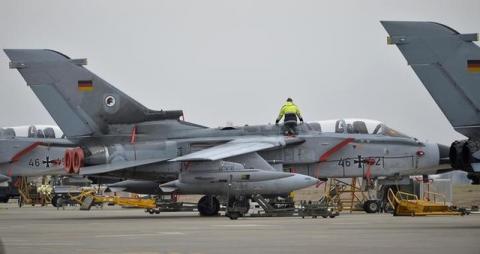Advertisement
Spurred by Trump and Brexit, EU plans defense research boost
BRUSSELS (Reuters) - The European Union unveiled its biggest defense research plan in more than a decade on Wednesday to reverse billions of euros in cuts and send a message to U.S. President-elect Donald Trump that Europe wants to pay for its own security.
Part of a broader push to revitalize defense cooperation, the European Commission proposed a 5 billion-euro ($5.3 billion) fund and a lifting of rules preventing the EU's common budget and its development bank from investing in military research.
"This is not about an EU army, this is not about spending on the military instead of social security," European Commission Vice President Jyrki Katainen said. "We face multiplying threats and we must act," the former Finnish premier said, stressing that all assets developed would belong to national governments.
The main proposal is an investment fund for defense, which could allow EU governments that pay into it also to borrow, ensuring funds are always available for joint defense programs such as helicopters or drones.
The fund should be able to mobilize about 5 billion euros a year, Katainen told reporters, although that figure is an estimate and needs to be refined. Contributors could change over time.
The fund could be backed by the European Investment Bank to finance projects if a majority of governments agree to remove the ban on backing military projects, changing the so-called eligibility criteria, possibly as early as next year.
One proposal is for the fund, which would require an intergovernmental treaty to be set up, to raise capital on financial markets by issuing bonds, with the Commission offering to run the fund but taking no ownership in it.
In a gesture to indebted France and Italy, government capital in the fund that is not spent directly on purchasing equipment could be excluded from national budget deficits that EU rules require to be under 3 percent of economic output.
"SPENDING TOGETHER"
Separately, the Commission, which oversees a common EU budget of about 150 billion euros a year, says it is time to allow it to be used for military research. It proposes a target of 500 million euros a year from 2021.
A 90 million euro pilot plan is set to get under way next year and the Commission could potentially allocate 3.5 billion euros from the budget between 2021 and 2027.
"It won't be easy but we need to spend better by spending together," said EU Industry Commissioner Elzbieta Bienkowska, adding that money would be for agreed projects, not an open invitation for broad research.
However, the sums as currently envisaged remain too small to make any near-term impact on major defense firms, with stocks mostly flat or tracking the market on Wednesday.
Defense research spending by EU governments has fallen by a third since 2006, leaving the EU reliant on the United States for advanced warfighting equipment.
"Europe has to be very careful that the investment gap is not translated into an ever-wider technology gap," EU foreign policy chief Federica Mogherini said earlier this month.
During the U.S. election campaign, Trump questioned whether the United States should protect allies seen as spending too little on their defense, raising fears that he could withdraw funding for NATO at a time of heightened tensions with Russia.
A report by the German military seen by Reuters showed its Tornado jets were ready for use just 44 percent of the time and its newer Eurofighters had a readiness rate of 52 percent, well under the goal of an average 70 percent readiness.
25-BLN EURO WASTE
An earlier Commission plan in 2003 failed to win over governments; Britain, especially, has argued that deeper EU defense integration could undermine NATO. This time around, France, Germany and Italy are hoping that Britain's decision to quit the bloc will remove a barrier to deeper cooperation.
Britain's pending departure removes one of the biggest contributors to the EU budget, although it is not clear if it would seek to collaborate on defense from outside the bloc.
"We see EU defense as detrimental to NATO, but if there are major collaborative research projects, we would want to be part of them," said Geoffrey Van Orden, a former brigadier in the British army and now a conservative lawmaker in the European Parliament.
Germany and France say sharing resources may be the only way to sustain adequate military forces, although many in the defense industry primarily blame the slow progress towards cooperation on political and operational differences between nations rather than the lack of central support.
Wasted funds amount to 25 billion euros a year, as governments champion national defense contractors and duplicate each other's efforts by making different versions of the same thing. The bloc has 19 types of armored infantry fighting vehicle, compared with one in the United States.
(Additional reporting by Andrea Shalal in Berlin and Tim Hepher in Paris; Editing by Alastair Macdonald and Mark Trevelya



















Add new comment